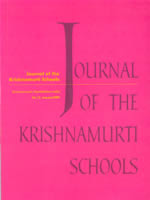Issue 13 - January 2009
- Written by J. Krishnamurti
We have heard people say, that without ambition, we cannot do anything.
- Written by Ahalya Chari, O. R. Rao
The thirteenth issue of the Journal is in your hands.
- Written by O. R. Rao
To give knowledge which does not become an end in itself and to educate the mind to have a long vision, a wide comprehension of life, is not possible if education is based on authority.
- Written by Kanthi Phatak
Exulting in an unexpected shower in the summer, running off to float paper boats in puddles after the rains, looking for delicious berries at a particular time of the year, watching little insects, picking wild flowers to make bouquets, finding shining smooth pebbles or shells, feeling the soft sand and the rushing water on the beach, climbing a giant tree, running up and down a hillside—the list can go on.
- Written by Siddharth Menon
The Truth must dazzle gradually Or every man be blind Emily DickinsonEarly in my Literature course with students newly come into Class 11, I have given them these lines of poetry to consider: The apparition of these faces in the crowd; Petals on a wet, black bough.
- Written by V. Arun
It is quite astonishing that adults know so little of the world around them.
- Written by Keerthi L. Mukunda
As an English teacher I have found great joy in the exploration of meaningful writing with junior and middle school children.
- Written by Tanuj Shah
The purpose, the aim and drive of these schools is to equip the child with the most excellent technological proficiency so that the student may function with clarity and efficiency in the modern world.
- Written by Editors
There are indeed many things that we consciously teach children, both at home and at school.
- Written by N. Venu
Poor effectiveness and quality plague our school system.
- Written by R. Venkatesh
We have all had some great teachers. Or at least, if we have not been fortunate enough, we have heard of great teachers.
- Written by Ruth Chandy
Some years ago, I attended a workshop conducted in Bangalore by teachers from the Royal College of Music, Stockholm.
- Written by Shabari Rao
Most often when I lead a dance class for the first time, the response I get from the boys is, ‘Yuuuuukkkkk dance! It’s for girls!’; and from the girls it is, ‘But when are we going to dance?’ By the end of the session all the children would have engaged with ideas, and used their bodies to express these in space.
- Written by Kalpana Venugopal
Holistic education is a philosophy of education based on the premise that each person finds identity, meaning, and purpose in life through connections to the community, to the natural world, and to spiritual values such as compassion and peace.
- Written by Stephen Smith
Prefatory NoteSince the publication in July 2 2006 of the Journal of Krishnamurti Schools ‘dedicated to the teacher’, there has been an increasing, if varied, response to the necessary task of educating the educator.
- Written by Ashna Sen
An e-mail query in support of a Turkish Mathematics Village more than a year ago lead to a most illuminating, intellectually broadening and exciting experience at the annual Turkish Mathematics Summer School in the idyllic and sleepy but enchanting village of Sirince.
- Written by Brian Edwards
Envy is a curious emotion with a long and tragic history in human affairs.
- Written by Sumitra M. Gautama and Suchitra Ramakumar
The School, KFI, Chennai has created a new methodology that seeks to build a link between knowledge and empowerment, to equip each student with the ability to think, to apply and to discover.
- Written by Kabir Jaithirtha
The perception of beauty is an essential aspect of the teachings of J. Krishnamurti and has deep implications for education.


